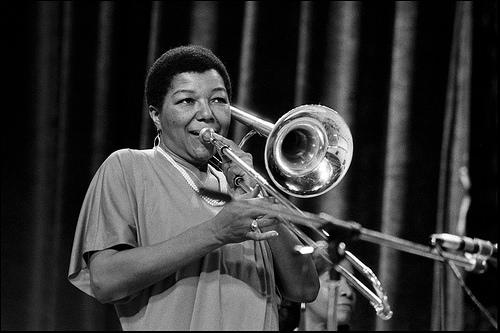Her Authentic Life
March is National Women’s History Month! We’ll be sharing stories about some of the most accomplished women in jazz, both nationally and locally. We hope you enjoy this tribute to the women of jazz.
***
Melba Liston broke barriers with her trombone. She was the first woman to play the instrument in big bands in the 1930s and ‘40s. She was also a brilliant composer and arranger. But Liston reinvented herself more than once because she often couldn’t take the stress and pressure that came with being a women in jazz in that era.
Melba Doretta Liston was born in 1926 in Kansas City, MO. Her mother gave her a trombone when she was 7 and by the age of 8 she was soloing on a local radio station. At 10, she moved to LA and started playing with youth bands but in just a few years she was playing with some of the biggest bands around, including Duke Ellington, Dizzy Gillepsie and Quincy Jones. She also toured with Billie Holiday and Count Basie but, by 1949, she was discouraged. She found life on the road – often as the only woman – to be difficult and she thought audiences could be rude and indifferent. So she stepped away. She took up teaching, then held a clerical job, she was even an extra in the blockbuster film, “The Ten Commandments.”
In 1956, she was ready for more jazz , rejoining Dizzy Gillespie and later forming an all-girl quintet. She toured Europe with a Quincy Jones show one year, appeared on albums with Ray Charles and formed a lasting musical partnership with pianist Randy Weston. They collaborated on two albums, both considered masterpieces: “Uhuru Afrika” in 1960 and “Highlife” in 1963.
And then, despite the acclaim, she decided it was time to leave jazz again. This time she moved to Jamaica where she taught school for six years, recording a little reggae while there.
Liston suffered a stroke in 1985 that left her partially paralyzed. In 1987 she was named a Jazz Master by the National Endowment for the Arts. Sadly, she died in LA in 1999. In her 73 years, she lived as a pioneer of sorts, making decisions that rang true for her, twice leaving fame and fortune behind for a life that felt more authentic. Her music, her teaching, her resilience and her courage are today remembered and respected in the world of jazz and beyond.
9(MDA3NDU1Nzc2MDEzMDUxMzY3MzAwNWEzYQ004))
Become a Member
Join the growing family of people who believe that music is essential to our community. Your donation supports the work we do, the programs you count on, and the events you enjoy.
Download the App
Download KUVO's FREE app today! The KUVO Public Radio App allows you to take KUVO's music and news with you anywhere, anytime!
